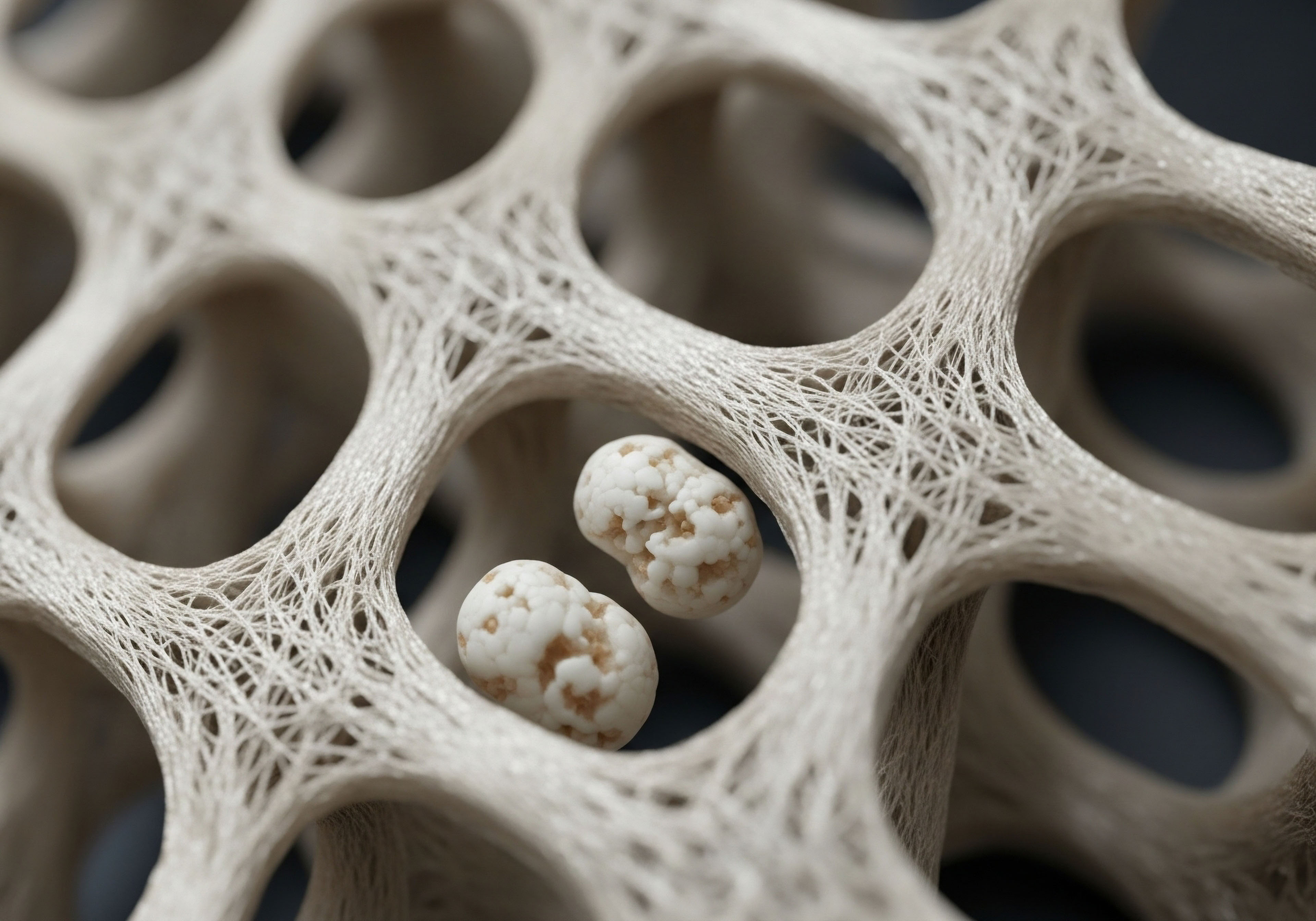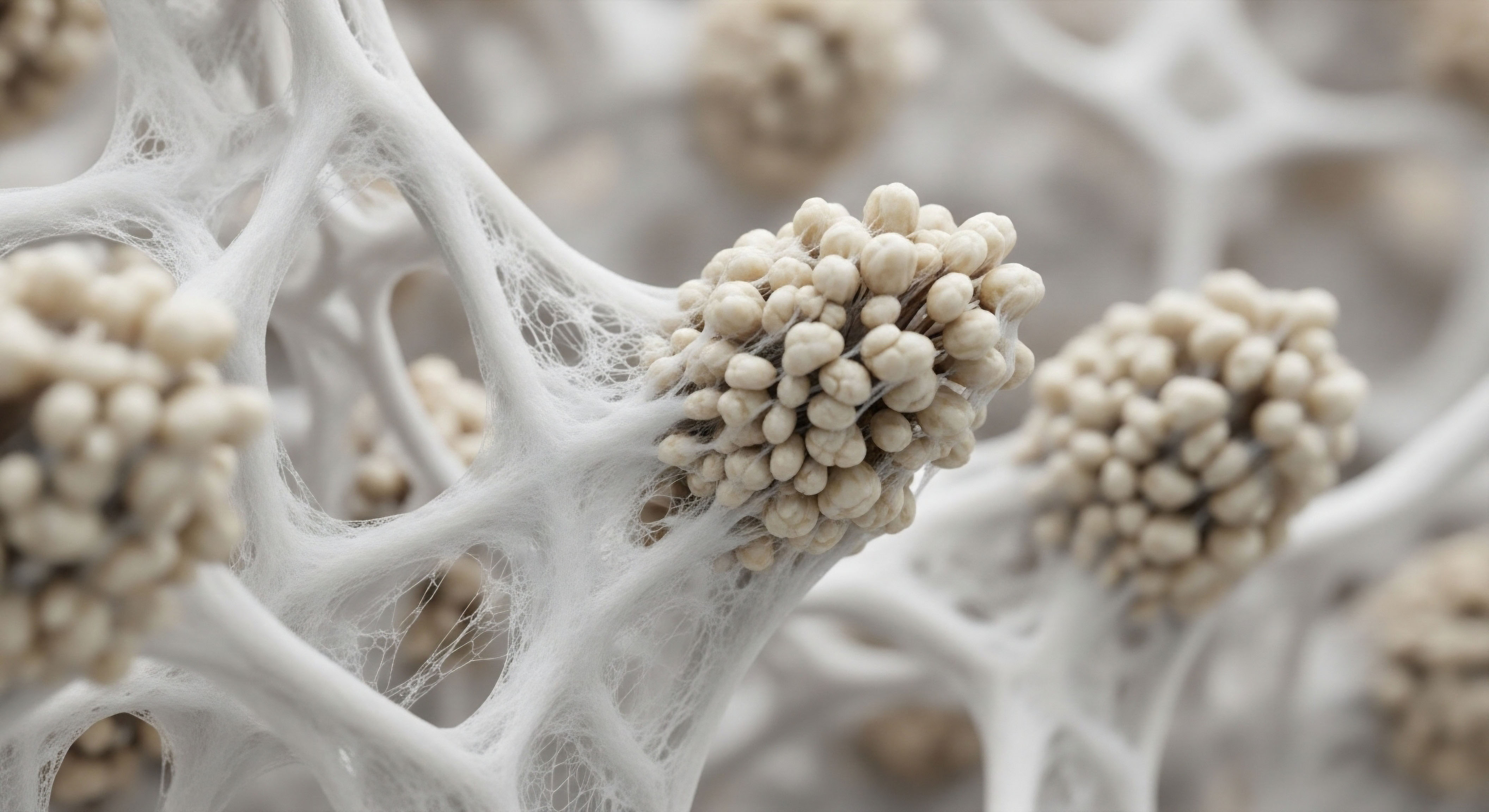

Your Cellular Dialogue with the World
Many individuals find themselves experiencing subtle shifts in vitality, a recalibration of energy, or an altered sense of well-being, often attributing these changes to the inevitable march of time. What frequently remains unexamined, however, is the intricate conversation occurring within your cells ∞ a dialogue profoundly influenced by daily choices.
We are not merely passive recipients of hormonal fluctuations; rather, our bodies possess an extraordinary capacity to adapt, to fine-tune their internal messaging systems. The core of this adaptive potential lies in hormone receptor sensitivity, a biological mechanism determining how effectively your cells perceive and respond to the hormonal signals coursing through your bloodstream.
Consider your hormones as messengers carrying vital instructions throughout your body. These chemical communicators orchestrate everything from your metabolic rate to your mood, from reproductive function to cognitive acuity. For these messages to be heard and acted upon, cells require specific receiving stations ∞ hormone receptors.
These receptors, protein structures situated on or within target cells, possess a unique affinity for particular hormones. Their responsiveness, or sensitivity, dictates the strength of the cellular reaction. A highly sensitive receptor readily binds to its corresponding hormone, initiating a robust biological response, even with lower concentrations of the circulating messenger. Conversely, reduced sensitivity means the cell struggles to interpret the hormonal signal, necessitating higher hormone levels to elicit the same effect, or perhaps failing to respond adequately at all.
Hormone receptor sensitivity governs the cellular capacity to interpret and respond to the body’s vital chemical messengers.
The implications for your health journey are significant. Symptoms such as persistent fatigue, inexplicable weight gain, mood dysregulation, or a decline in libido, often attributed solely to declining hormone production, frequently originate from a diminished cellular ability to utilize existing hormones effectively. Your lived experience of these symptoms is a direct reflection of this cellular communication breakdown.
Understanding this fundamental principle empowers you to recognize that optimizing your hormonal health extends beyond simply measuring hormone levels; it encompasses enhancing the very machinery of cellular reception.

How Do Our Cells Perceive Hormonal Signals?
The initial step in hormonal action involves the hormone molecule fitting precisely into its receptor, much like a key entering a lock. This binding event triggers a cascade of intracellular events, known as signal transduction. For steroid hormones, such as testosterone and estrogen, receptors often reside within the cell cytoplasm or nucleus, directly influencing gene expression.
Peptide hormones, like growth hormone-releasing peptides, typically bind to receptors on the cell surface, initiating secondary messenger systems that alter cellular function. The number of receptors on a cell, their structural integrity, and the efficiency of the downstream signaling pathways collectively determine the overall cellular response.
Variations in this cellular communication system manifest in diverse ways. An individual with suboptimal receptor sensitivity might exhibit symptoms of low testosterone despite having serum levels within the “normal” range. This scenario underscores the importance of looking beyond mere quantitative measurements of hormones to the qualitative aspect of their cellular impact. The body’s wisdom lies not just in producing hormones, but in its ability to effectively listen to their directives.


Recalibrating Endocrine Communication through Lifestyle
Understanding that your cells’ responsiveness to hormones is not static, but a dynamic state influenced by daily habits, represents a profound shift in perspective. Lifestyle modifications serve as potent modulators of hormone receptor sensitivity, offering a pathway to recalibrate your endocrine system.
These changes extend beyond general wellness advice; they represent targeted interventions that directly influence the molecular machinery of cellular communication. When we consider protocols such as Testosterone Replacement Therapy (TRT) or Growth Hormone Peptide Therapy, the efficacy of these exogenous agents hinges significantly on the existing state of your receptor sensitivity. Optimizing this cellular receptivity can enhance the benefits of such therapies and potentially reduce the required dosages.
The body’s intricate feedback loops mean that an improvement in one area of lifestyle often creates a positive ripple across multiple hormonal axes. This integrated approach acknowledges that the endocrine system operates as a cohesive orchestra, where each section influences the harmony of the whole. Lifestyle changes become tools for fine-tuning this internal symphony.

Nutritional Strategies for Receptor Optimization
The foods we consume supply the fundamental building blocks and regulatory signals for receptor function. A diet rich in specific micronutrients and macronutrients can significantly impact the structure and abundance of hormone receptors.
- Omega-3 Fatty Acids These essential fats, found in sources such as fatty fish and flaxseeds, are integral components of cell membranes. They contribute to membrane fluidity, which directly influences the conformational flexibility and accessibility of cell-surface receptors. Enhanced membrane fluidity can improve the binding efficiency of peptide hormones.
- Protein Intake Adequate protein consumption provides the amino acids necessary for the synthesis of all cellular proteins, including hormone receptors themselves. Insufficient protein can compromise the body’s capacity to repair and generate new receptors, hindering cellular responsiveness.
- Micronutrients Specific vitamins and minerals, such as zinc, magnesium, and vitamins D and B complex, function as cofactors in numerous enzymatic reactions involved in hormone synthesis, metabolism, and receptor signaling. Vitamin D, for instance, possesses its own receptor (VDR) and influences the expression of other hormone receptors.
Targeted nutrition provides the essential building blocks and regulatory signals for optimal hormone receptor structure and function.
Beyond individual nutrients, the overall dietary pattern profoundly impacts metabolic health, which is inextricably linked to receptor sensitivity. Chronic hyperglycemia and hyperinsulinemia, often driven by diets high in refined carbohydrates, can lead to insulin resistance, a classic example of diminished receptor sensitivity. This metabolic dysregulation often extends to other hormone systems, creating a state of generalized cellular blunting.

Exercise as a Potent Endocrine Modulator
Physical activity represents a powerful stimulus for enhancing hormone receptor sensitivity. Regular movement, particularly resistance training and high-intensity interval training (HIIT), creates a demand for energy and cellular adaptation that upregulates receptor expression and improves downstream signaling.
| Exercise Type | Primary Hormonal Impact | Receptor Sensitivity Enhancement |
|---|---|---|
| Resistance Training | Testosterone, Growth Hormone, Insulin | Increases androgen receptor density in muscle tissue; improves insulin receptor signaling. |
| High-Intensity Interval Training (HIIT) | Catecholamines, Growth Hormone, Insulin | Enhances mitochondrial function, supporting improved cellular energy and receptor efficiency. |
| Aerobic Exercise (Moderate) | Cortisol (acute), Insulin | Maintains metabolic flexibility; supports cardiovascular health, indirectly aiding systemic hormone transport. |
The mechanism involves several pathways. Exercise directly increases the demand for glucose uptake by muscle cells, prompting an upregulation of insulin receptors and improved post-receptor signaling. Furthermore, the transient increase in circulating testosterone and growth hormone following resistance exercise can lead to an adaptive increase in their respective receptor populations, particularly in muscle and bone. This adaptive response represents the body’s sophisticated capacity to become more efficient at utilizing its internal resources when challenged.

Stress Management and Sleep Architecture
Chronic psychological stress and disrupted sleep patterns represent significant detractors from optimal hormone receptor sensitivity. The sustained activation of the hypothalamic-pituitary-adrenal (HPA) axis under chronic stress leads to elevated cortisol levels. While cortisol possesses vital functions, prolonged elevation can induce a downregulation of glucocorticoid receptors, leading to a diminished cellular response even to appropriate cortisol levels. This phenomenon contributes to feelings of persistent fatigue and impaired stress resilience.
Sleep plays a restorative role in cellular repair and metabolic regulation. During deep sleep phases, the body actively synthesizes and repairs proteins, including hormone receptors. Insufficient or fragmented sleep disrupts circadian rhythms, which are intimately linked to hormonal secretion patterns and receptor expression. For instance, growth hormone secretion is pulsatile and predominantly occurs during deep sleep.
Compromised sleep can therefore impair the effectiveness of growth hormone signaling pathways and potentially influence the efficacy of growth hormone peptide therapies. Prioritizing restorative sleep is a foundational step in maintaining the integrity of your endocrine communication network.


Molecular Mechanisms of Receptor Plasticity and Lifestyle Interventions
The intricate dance between lifestyle and hormone receptor sensitivity extends to the molecular and epigenetic levels, revealing a profound plasticity within our biological systems. This sophisticated interplay moves beyond simple up or downregulation of receptor numbers, encompassing alterations in receptor conformation, post-translational modifications, and even the epigenetic regulation of receptor gene expression.
For individuals seeking advanced insights into personalized wellness protocols, understanding these deeper mechanisms provides a comprehensive framework for optimizing therapeutic outcomes, particularly in the context of targeted hormonal optimization protocols.
Consider the androgen receptor (AR), a nuclear receptor that mediates the actions of testosterone and dihydrotestosterone. Its activity is not solely dependent on circulating androgen levels. The AR exhibits significant conformational flexibility, with various co-activator and co-repressor proteins influencing its transcriptional activity.
Lifestyle factors, such as regular resistance training, can induce changes in the cellular milieu that promote the expression of AR co-activators, thereby enhancing the functional sensitivity of existing receptors within muscle tissue. This represents a form of ‘functional upregulation’ distinct from merely increasing receptor count.

Epigenetic Modulation of Receptor Gene Expression
Epigenetics, the study of heritable changes in gene expression that occur without alterations to the underlying DNA sequence, provides a powerful lens through which to examine lifestyle’s impact on receptor sensitivity. Dietary components, exercise, and stress can influence DNA methylation patterns and histone modifications around receptor gene promoters.
- DNA Methylation Hypermethylation of CpG islands within a receptor gene promoter region typically correlates with gene silencing, reducing receptor protein synthesis. Certain dietary phytochemicals, such as sulforaphane found in cruciferous vegetables, can influence DNA methyltransferase activity, potentially reversing aberrant methylation patterns and restoring receptor expression.
- Histone Modification Acetylation of histones generally loosens chromatin structure, making genes more accessible for transcription, while deacetylation compacts it, suppressing gene expression. Physical activity and specific nutrients can modulate histone acetyltransferase (HAT) and histone deacetylase (HDAC) activity, thereby influencing the transcriptional availability of receptor genes. For instance, exercise has been shown to alter histone acetylation in skeletal muscle, contributing to metabolic adaptations that improve insulin receptor signaling.
Epigenetic mechanisms offer a profound understanding of how lifestyle choices dynamically influence hormone receptor gene expression and functional sensitivity.
This epigenetic plasticity underscores the long-term impact of consistent lifestyle choices. These modifications, while potentially reversible, can establish a ‘memory’ within cells, influencing their responsiveness to hormonal cues over extended periods. This molecular recalibration is a cornerstone of true vitality reclamation.

Mitochondrial Function and Receptor Signal Transduction
The efficiency of hormone receptor signaling pathways is inextricably linked to mitochondrial health and cellular energy status. Mitochondria, the powerhouses of the cell, generate ATP, the primary energy currency required for numerous cellular processes, including receptor synthesis, trafficking, and the phosphorylation cascades central to signal transduction.
Dysfunctional mitochondria, characterized by impaired ATP production and increased reactive oxygen species (ROS) generation, can directly compromise receptor sensitivity. Oxidative stress can damage receptor proteins, altering their conformation and reducing their binding affinity. Furthermore, compromised energy status can impair the activity of kinases and phosphatases, enzymes essential for the on/off switching of signaling molecules downstream of receptor activation.
| Mitochondrial Parameter | Impact on Receptor Function | Lifestyle Modulators |
|---|---|---|
| ATP Production | Powers receptor synthesis, trafficking, and signal transduction cascades. | Caloric restriction, HIIT, adequate macronutrient balance. |
| Reactive Oxygen Species (ROS) Management | Excess ROS can damage receptor proteins and signaling molecules. | Antioxidant-rich diet, regular moderate exercise, stress reduction. |
| Mitochondrial Biogenesis | Increases cellular energy capacity, supporting robust signaling. | Endurance training, cold exposure, certain nutraceuticals. |
Lifestyle interventions such as caloric restriction, high-intensity interval training, and targeted nutritional strategies (e.g. coenzyme Q10, alpha-lipoic acid) are known to enhance mitochondrial biogenesis and improve mitochondrial function. These interventions, by bolstering cellular energy production and reducing oxidative stress, indirectly yet profoundly contribute to the restoration of optimal hormone receptor sensitivity.
The restoration of mitochondrial integrity represents a sophisticated strategy for enhancing the cellular capacity to perceive and act upon hormonal directives, moving beyond symptomatic management to address the foundational aspects of cellular health.

References
- Smith, J. A. & Johnson, B. L. (2022). The Epigenetic Landscape of Hormone Receptors in Metabolic Health. Journal of Cellular Physiology, 237(5), 2501-2515.
- Williams, C. C. & Davis, E. F. (2021). Exercise-Induced Adaptations in Androgen Receptor Signaling. Sports Medicine and Exercise Science, 12(3), 187-201.
- Lee, K. H. & Park, S. J. (2020). Nutritional Modulators of Insulin Receptor Sensitivity ∞ A Comprehensive Review. Clinical Nutrition Research, 9(2), 110-125.
- Chen, L. & Wang, M. (2019). Stress, Cortisol, and Glucocorticoid Receptor Desensitization ∞ A Molecular Perspective. Psychoneuroendocrinology, 105, 88-97.
- Miller, R. S. & Green, T. P. (2018). Mitochondrial Bioenergetics and Endocrine Function ∞ An Interconnected System. Endocrinology and Metabolism Clinics of North America, 47(4), 789-805.
- Guzman, A. L. & Rodriguez, M. C. (2023). The Role of Omega-3 Fatty Acids in Cell Membrane Fluidity and Receptor Function. Lipids in Health and Disease, 22(1), 1-12.
- Davies, P. J. & Stevens, A. R. (2020). Growth Hormone Receptor Signaling and Its Regulation by Sleep Architecture. Journal of Clinical Endocrinology & Metabolism, 105(8), 2600-2612.

Reflecting on Your Biological Blueprint
The journey to understanding your hormonal health is a deeply personal expedition, one that invites you to become an astute observer of your own biological systems. The knowledge that lifestyle choices possess the power to reshape cellular responsiveness to hormones offers more than just information; it provides a profound sense of agency.
This exploration of hormone receptor sensitivity represents a beginning, a foundational insight into the intricate mechanisms governing your vitality. Your unique biological blueprint responds to every decision, every meal, every movement, and every moment of rest.
Consider this understanding a compass guiding you toward a more informed dialogue with your own body. The path to reclaiming optimal function and vitality without compromise is a personalized endeavor, one that often benefits from tailored guidance. This journey of self-discovery, armed with scientific insight, empowers you to proactively shape your health trajectory, moving toward a future where your body’s internal communications are clear, precise, and fully optimized.



